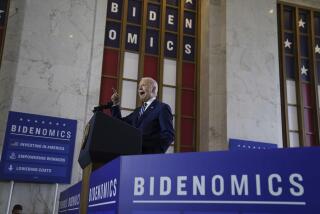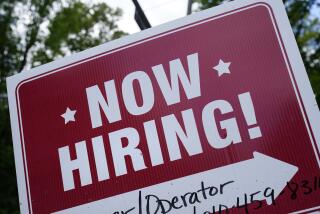Bush’s 1st Economic Message Sees Even More Good Times
- Share via
WASHINGTON — President Bush, proclaiming the United States in “excellent economic health,” sent his first economic report to Congress today. He promised to restrain government spending and push for tax cuts to foster even more prosperity.
Bush said he will continue his fight to get Congress to reduce the capital gains tax and pledged anew to fight protectionist trade barriers.
His message did not dwell on what many see as the biggest failures of the Reagan years--the record federal budget deficits and the huge trade imbalances that transformed America from the largest creditor nation to the largest debtor country.
Bush did pledge to deal with “inherited problems,” but his formula for dealing with the budget deficit tracked Reagan’s approach, promising to oppose new taxes while relying on economic growth and restraints in government spending to erase the deficit by 1993.
Many private economists say the Administration’s economic outlook for the next five years is too optimistic.
The Administration foresees no recession, with the gross national product expanding at annual rates of 3% or higher from 1991 through 1995. “Economic expansions . . . do not die of old age. A recession is not likely in the near term,” the economic report states.
While stressing traditional Republican free-market themes, the 419-page, annual “Economic Report of the President” avoided some of the more doctrinaire positions on monetary policy and supply-side economics sounded during the Reagan years.
Instead, Bush used the message, the first presented by his Administration, to lay out generally mainstream economic goals such as the need for growth-oriented policies and renewed efforts to bring the federal deficit under control.
On taxes, Bush said: “One of my highest legislative priorities this year is to reduce the capital gains tax rate. This tax reform would promote risk-taking and entrepreneurship by lowering the cost of capital. . . . A capital gains tax cut would stimulate saving and investment throughout the economy.”
“The primary economic goal of my Administration is to achieve the highest possible rate of sustainable economic growth,” Bush said in the report. “Growth is the key to raising living standards, to leaving a legacy of prosperity for our children, to uplifting those most in need and to maintaining America’s leadership in the world.”
Bush reviewed the period since the end of the 1981-82 recession, a peacetime record of seven years of expansion. In that time, more than 20 million jobs have been created, driving the unemployment rate down to a level not seen since the early 1970s.
“Our excellent economic health will allow us to build on the successes of the 1980s as we prepare for the next century,” Bush said.
Bush declared that his top trade priority is successful completion of the current 96-nation round of trade talks. The President is seeking to eliminate farm subsidies and expand trading opportunities in banking, insurance and other service industries in which American firms excel.
“We cannot remain competitive by avoiding competition. My Administration will therefore continue to resist calls for protection and managed trade,” he said.
Bush also rejected proposals for the federal government to promote an “industrial policy” of picking winners and losers among emerging technologies, declaring that “second-guessing the market is the way to raise government spending and taxes, not living standards.”
While sometimes critical of the Federal Reserve Board’s interest rate policies in his first year in office, the President praised the central bank for a “high degree of policy credibility.”
In a departure from the monetarist leanings of the Reagan Administration, Bush’s economic outlook warned against a reliance on “rigid monetary targeting,” the process promoted by certain economists in which the central bank focuses solely on controlling the growth of the nation’s money supply as the way to keep inflation at bay.
More to Read
Get the L.A. Times Politics newsletter
Deeply reported insights into legislation, politics and policy from Sacramento, Washington and beyond. In your inbox twice per week.
You may occasionally receive promotional content from the Los Angeles Times.










